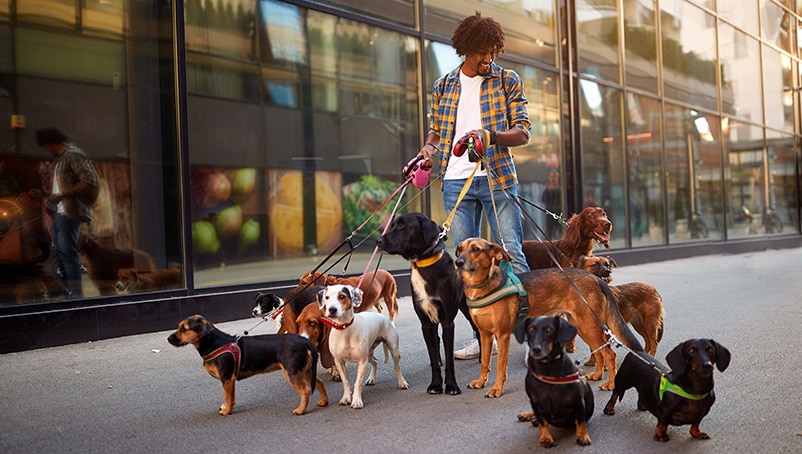Are you starting or growing a dog walking business? Congratulations on getting into a line of work where you'll be able to share your love of animals and also earn money.
Dog walking can be a rewarding and fun business. You may be wondering how to get a dog walking license. The answer differs depending on where you live and where you'll be walking your precious canine clients. You may also need a pet sitting license if you will take animals into your home temporarily, also known as a dog sitting license.
Do You Need a License to Walk Dogs?
Depending on where you're running your business and how many dogs you walk at a time, you may or may not need a dog walking license.
However, do you need a license to be a dog walker in a small town? It's difficult to find a small town or suburban area that requires a dog walking license. On the other hand, do you need a license to be a dog walker in a large city?
Going through the licensing process is part of how to become a licensed dog walker. Several larger cities do require dog walking or pet sitting licenses. These include:
- San Francisco: In addition to having a complete and current business registration, the city requires you to complete commercial dog walker training. If you haven't completed the training, you must have finished a commercial dog walker apprenticeship. Alternatively, you must prove you have worked as a professional dog walker in San Francisco or worked for a licensed, trained professional dog walker in the city for three consecutive years. You also need to have a valid drivers' license or state identification and general business liability insurance in the amount of $1 million or greater. The initial permit fee for being a commercial dog walker in San Francisco is $285, with a $114 annual renewal fee.
- New York City: New York City had a specific dog walking license process for a few years but the city now includes dog walking licenses with its small animal boarding establishment permits. You must prove you've completed the city's animal care and handling course and certificate, which lasts 12 hours over two days and costs $39. You must also provide the city with proof that you provide Workers Compensation or Disability Insurance (if you have employees) and provide copies of your state business license. You also need a Certificate of Authority to Collect Sales Tax. The initial permit fee for being a commercial dog walker in New York City is $105, with a $70 annual renewal fee.
Other cities which require either a pet sitting license or a dog walking license for dog walking businesses include Seattle and King County, which issues permits and has requirements for dog walkers in city or county parks or streets, and Chicago, which asks businesses caring for pets in any way, including grooming, to obtain an animal care license.
Are There Any Differences Between a Dog Walking License and a Pet Sitting License?
Most cities have the same name for licenses they require for animal care businesses.
For example, Chicago refers to its city license for any type of pet care, grooming, or transportation as an "animal care license." New York City's license is a "small animal boarding establishment permit." Pet sitting fits under the category of animal care or small animal boarding. If you're providing pet sitting care — even for one day a week during the daytime — you'll need an animal care license or boarding permit.
What are Dog Walking Business License Types and Regulations?
As noted, a few larger cities have specific dog walking licenses and animal care certificates. The courses cover local laws and regulations. For example, San Francisco limits dog walkers to only eight dogs walked at a time, and it also limits leash lengths to eight feet.
Another category to consider is animal transportation. If you transport animals in your own vehicle, your city may also want to inspect the vehicle for safety purposes. San Francisco requests professional pet sitters and dog walkers in the city to get a vehicle safety inspection besides their dog walking licenses and regulations.
Even if your town, county, or city doesn't have an official dog walking or pet sitting license requirement, you will need a regular business license in your state. In most cities and counties, you also need a city or county business license. Each state has different requirements. If you're a one-person dog walking business, you'll usually be able to apply for a license as a sole proprietor or individual. If you employ other people in addition to yourself, you will need insurance for them also, including workers’ compensation and disability insurance.
You may also see references to animal bailee coverage. Animal bailee coverage will provide $10,000 to $25,000 in one-time coverage if an animal in your care escapes, is injured, or even killed. In cities that require a dog walking license or pet sitting license, you will need to have general liability insurance, usually in the amount of $1 million or more.
Can You Work Without a License and What are the Consequences?
If you live in an area that doesn't request you to have a specific dog walking license or pet sitting license, you can work without those specific licenses. You will still need a general business license for your city, county, and state (if required). More cities are becoming conscious of problems that could arise from unlicensed dog walkers. You are required to obey local dog-walking legal requirements like leash laws and picking up dog waste.
The consequences for not having a license in a city where one is required will probably be a fine of several hundred dollars. If you want to continue your business, you must also pay for the license. All cities that require dog walker licenses also require dog walker insurance. Dog walking insurance and business insurance is an absolute "must." You want to be covered in case anything goes wrong. You can't predict everything that can happen. While you're walking the dogs in your care, you might experience a problem that isn't your fault. In that case, you'll want insurance to help pay for veterinarian care, or to pay for medical care for you or any other person nearby in case of accident or injury.






